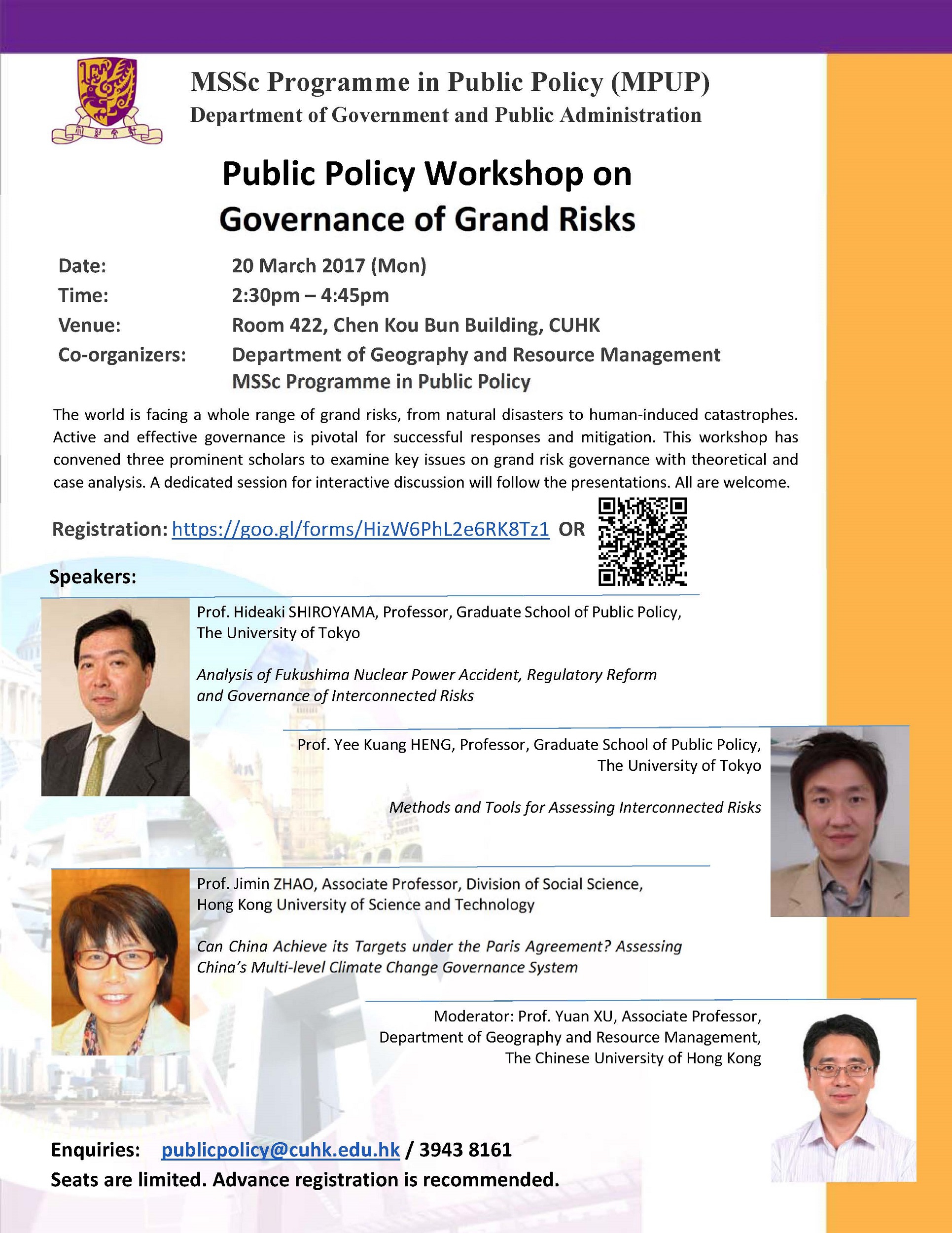活動
Public Policy Workshop on Governance of Grand Risks
2017年3月20日
2:30pm – 4:45pm
Room 422, Chen Kou Bun Building, CUHK
Professor Hideaki SHIROYAMA, Professor, Graduate School of Public Policy, The University of TokyoProfessor Yee Kuang HENG, Professor, Graduate School of Public Policy, The University of TokyoProfessor Jimin ZHAO, Associate Professor, Division of Social Science, Hong Kong University of Science and Technology
Prof. Hideaki SHIROYAMA, Professor, Graduate School of Public Policy, The University of Tokyo
Prof. Shiroyama is a professor of public administration at the Graduate School of Public Policy and the Graduate School for Law and Politics, The University of Tokyo. He studies about global governance/ international administration, science/ technology and public policy and policy process. He was the Dean of the Graduate School of Public Policy from 2014 to 2016 and the Director of Policy Alternatives Research Institute from 2010 to 2014. He was also a Visiting Scholar at MIT from 1997 to 1999 and Visiting Professor at Science Po from 2008 to 2009. He is currently working on interdisciplinary program as the Director of Science, Technology, Innovation and Governance Program and the Coordinator of Graduate Program for Social Design and Management.
Prof. Yee Kuang HENG, Professor, Graduate School of Public Policy, The University of Tokyo
Prof. Heng from the Graduate School of Public Policy of The University of Tokyo, Japan, obtained his PhD in International Relations from London School of Economics and Political Science. Apart from teaching in top universities in Ireland, UK and Singapore, Professor Heng also teaches Executive Education Programmes for government officials and businessmen in Singapore, Brunei, Indonesia and Japan. His research interests include security studies, soft power in the Asia-Pacific, international peacekeeping and global cities and international relations. His latest publication is Managing Global Risks in an Urban Age: Singapore and the making of a Global City.
Prof. Jimin ZHAO, Associate Professor, Division of Social Science, Hong Kong University of Science and Technology
Prof. Zhao is an Associate Professor in the Division of Social Science at HKUST. Previously she was a Senior Research Fellow and Director of China Environment and Energy Programme at Oxford University (2007–2011). She has also worked at University of Michigan, Harvard University, and China’s Academy of Environmental Sciences. She received her Ph.D. in environmental policy at Stanford University, and her M.S. in environmental planning and management and B.S. degree from Peking University. Her research interests include environmental and energy policy and governance, climate change and global environmental governance, low-carbon city development, sustainable transportation and buildings, energy policy and technology development, focusing on China.
Registration: https://goo.gl/forms/HizW6PhL2e6RK8Tz1 (first-come-first-served)
publicpolicy@cuhk.edu.hk / 3943 8161
Prof. Hideaki SHIROYAMA
Analysis of Fukushima Nuclear Power Accident, Regulatory Reform and Governance of Interconnected Risks
Abstract: The Fukushima nuclear accident caused by the Great Eastern Japan Earthquake reveals the failure of interdisciplinary communication. After the accident, various processes for accident investigations and arguments for the reform of nuclear safety regulation were announced. After the negotiation between the ruling party and the opposition party, it was finally agreed in June 2012 that Nuclear Regulatory Authority, an independent administrative committee based on Article 3 of the National Government Organization Act, would be set up. But the issues such as the operation and capacity development of Nuclear Regulatory Authority, and the role of local government remains. The Great Eastern Japan Earthquake also proved the fact that a single risk (earthquake)’s interaction with the risks in other sectors (nuclear power plant) can develop into the so-called NaTech event and can bring about an amplified consequence (community evacuation and food radiation etc.). Such catastrophe has brought to the fore the importance of analyzing the interconnectedness of risks and developing resilient governance framework to deal with those risks. Current approach to risk governance has limitations about the range of “threat/ hazard” to be considered and the range of “consequences” to be responded. The attempt to analyze the complex interconnected nature of risks and the resilient governance frameworks that enable long-term and cross-sectoral response for future interconnected risks will be presented.
Prof. Yee Kuang HENG
Methods and Tools for Assessing Interconnected Risks
Abstract: An ability to surmount and bridge different policy worlds and domains is especially important when assessing and managing interconnected risks such as infectious pandemics; climate change or cyber-security that can manifest and morph in different ways to impact upon societies. This paper first begins with a theoretical overview of attempts to better assess and understand complex interconnected risks. Drawing from the World Economic Forum’s Global Risk Report 2015 ‘Interconnections Map’; the OECD Future Global Shocks report; Britain’s Foresight Project and National Risk Register, and Singapore’s Risk Assessment and Horizon Scanning programme, the paper highlights emerging methodologies and techniques such as crowd-sourcing and best practices for policymakers when dealing with complex interconnected risks. The paper concludes that a cross-sectoral response that blends cutting-edge futures analysis technologies with human cognitive responses best addresses the hazard-medium-consequence loop proposed in this panel.
Prof. Jimin ZHAO
Assessing China’s Multi-level Climate Change Governance System
Abstract: There is great urgency to better understand the ability of China’s governance system to successfully meet China’s targets under the Paris Agreement for mitigating climate risks. In this presentation, adopting a multi-level governance approach, I investigate the roles and interplay of national government, local governments, businesses, and NGOs, as well as their relationships with the national government; evaluate the effectiveness of current governance and policies to achieve carbon reduction; and identify key factors that influence the carbon actions taken by these actors. China is in a good position to meet its 2030 peak target of carbon emissions, with efforts to combat air pollution being a significant driving force. Even though the central government still plays a key role in defining policies and programs, climate governance has shifted from a centrally controlled system to a mix of central control and multi-level governance including local governments, industries, and NGOs. However, the carbon emission trading system which China plans to adopt nationally in 2017 still faces tremendous challenges.




